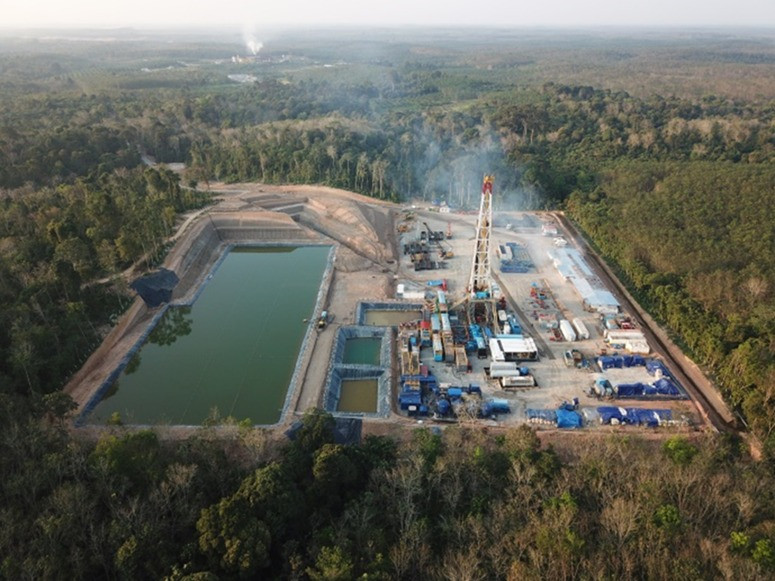Popular Reads
Top Results
Can't find what you're looking for?
View all search resultsPopular Reads
Top Results
Can't find what you're looking for?
View all search resultsExperts doubtful about RI's plan on carbon capture
Change text size
Gift Premium Articles
to Anyone
T
he government is preparing a regulation draft on carbon capture storage (CCS) and carbon capture utilization and storage (CCUS) as the country seeks to push its adoption to reduce carbon emissions from hard-to-abate industries, but whether this will be effective depends largely on a working financing mechanism.
Alloysius Joko Purwanto, an energy economist at the Economic Research Institute for ASEAN and East Asia (ERIA), said that the success of CCS/CCUS would need careful examination of the costs and benefits of other countries’ experiences in providing tax credits for technology development.
Furthermore, he suggested the government consider including carbon-tax schemes to ensure successful commercialization of CCS/CCUS projects.
“Moreover, would the entire problem surrounding CCS/CCUS implementation be solved just with a ministerial regulation? [It is important] to note that application of the technology involves other aspects [dealt with by] separate ministries,” Joko told The Jakarta Post on Thursday.
Read also: Indonesia delays carbon tax implementation again, 1 week before enactment
CCS/CCUS development is one of Indonesia's strategies for reaching net-zero emissions by 2060. The carbon-capture projects have been gaining momentum worldwide.
However, while the International Energy Agency (IEA) says the technology is critical to hitting global net-zero goals, it has been plagued by a high failure rate due to high capital costs, unclear revenue streams and limited technological readiness that risks leakage, as well as other issues.
In Indonesia, a lack of regulatory framework and high financial costs overshadow CCS/CCUS implementation, but investors expect the government to finish formulating a regulation to address some of these issues.
The Energy and Mineral Resources Ministry’s oil-and-gas Director General Tutuka Ariadji said that the government aims to finalize the Energy Ministry’s regulation on CCS/CCUS by the end of this year.
“The [Energy Ministry] has done its part in the [CCS/CCUS] draft regulation. Currently [the draft] is with the Law and Human Rights Ministry for the harmonization process,” he told reporters on Sept. 21.
Tutuka explained that the new regulation would introduce provisions on carbon injection technique and monitoring as well as cost mechanisms. While the former is deemed critical to prevent and anticipate leakage, the latter would stipulate, among other things, the terms and conditions regarding project costs.
“For example, if [the CCS/CCUS] project is included in the plan of development [POD], cost recovery would be possible as long as the project is located in a working area [...] so [everything] has to go through the Upstream Oil and Gas Special Regulatory Taskforce [SKK Migas],” he said, also on Sept. 21.
Cost recovery is the investment reimbursement given to oil-and-gas contractors after they begin production.
Read also: CO2 reduction ‘an obligation’ for upstream oil and gas: SKK Migas
Tracy Lothian, ExxonMobil’s vice president of marketing, financial and commercial development, emphasized the importance of policy support in encouraging CCS/CCUS implementation in the country.
She specifically suggested the Indonesian government issue a CCS/CCUS commercialization policy.
“Relevant stakeholders need to focus on decarbonization efforts in industries that produce high levels of carbon emissions to achieve net-zero emissions target,” Lothian said during the Indonesian Petroleum Association Convention and Exhibition (IPA Convex) on Sept. 22.
Separately, Mikel Erquiaga, Spanish oil-and-gas company Repsol’s director of regional exploration for the eastern hemisphere, said last year that he expected a new task force under the Energy Ministry to finish formulating a CCS/CCUS regulation to address some of these issues by the end of last year as the company gets ready to launch its inaugural CCS project in Indonesia in 2027.
Starting in 2027, the company planned to begin injecting roughly 2 million tonnes of captured carbon dioxide per year into the depleted Dayung and Gelam fields in the Sakakemang Block in South Sumatra.
Read also: Repsol to start operating 'first' CCS facility in Indonesia by 2027
To date, Indonesia is conducting research on CCS/CCUS implementation in 10 sites, including in oil-and-gas fields as well as in facilities with high-carbon emissions, according to Tutuka.
“CCS/CCUS is critical in the energy transition period as the technology is capable of reducing [carbon] emissions in various industrial sectors,” Tutuka said, also during an IPA Convex event on Sept. 22. “Indonesia is blessed with the geographical potential to [implement] CCS/CCUS technology [...] and lead [its use] in the region.”










